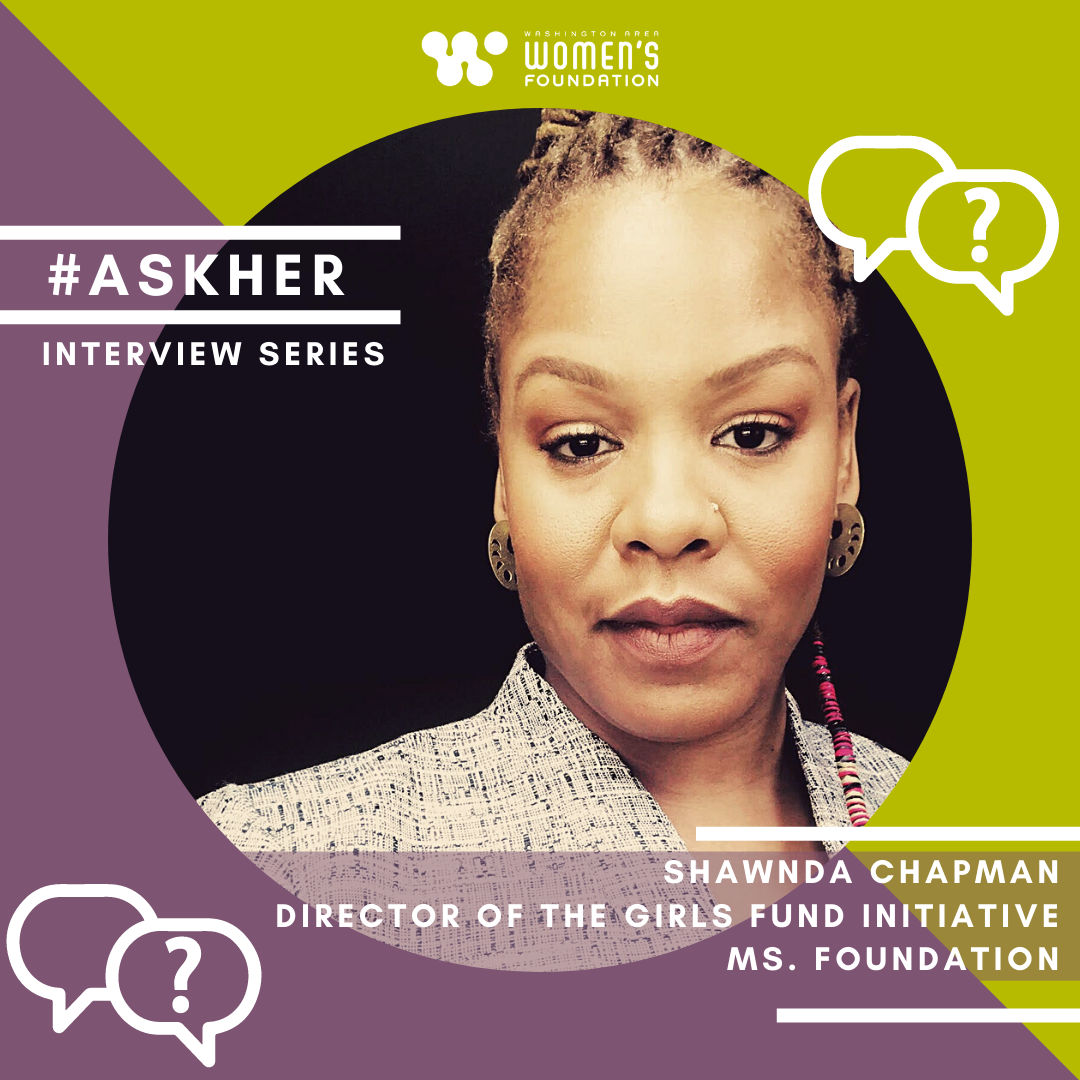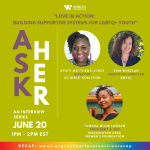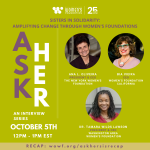Our #AskHer series is an interview with our partners, community members and supporters who work tirelessly for women and girls. This interview is with Shawnda Chapman, Director of the Girls Fund Initiative for Ms. Foundation. The interview was conducted at the end of 2020 by our Program Officer, Claudia Williams.
Claudia: Can you share a little bit about yourself, how did you come to the Ms. Foundation for Women, and what projects you have going on?
Shawnda: I believe people need all the experiences, I used to walk around thinking some of my experiences were a liability. And now, I really see them as an asset. My work is rooted in my own experiences as a survivor of sexual violence, and a survivor of the juvenile justice system. Many girls experience incarceration and gender-based violence that impact their lives.
I am excited to lend my voice as the Director of the Girls of Color Fund Initiative at the Ms. Foundation for Women, because up until recently I walked around closeted of my lived experiences. Being a survivor of sexual violence and someone who has been impacted by the justice system is usually something others make you feel you should hide—I felt people would judge me in professional spaces. But I came to a point where I thought to myself, “I had these experiences, and my knowledge of them, and the solutions I can propose, could really help somebody.” There are few of us with these experiences in decision making tables, so now I am honored to do this work, and I have a responsibility to myself, to communities, and to girls of color specifically, to incorporate my lived experiences in mainstream conversations and to normalize talking about them.
I have a background in research, and activism, and I bring some of that to the work at the foundation as well. I am currently focused on supporting the leadership and organizing of girls of color, the work has evolved quite a bit. We started calling this project the Girls Fund Initiative, and we are now explicit about our focus on girls of color, because we can’t bring about change, if we are not intentional about naming what we are working on. We are in the middle of a deep listening and learning process, working closely with girls’ advisory groups who are helping us to understand what girls of color are facing. We are moving away from top down approaches and know that girls of color are playing an important role in leading our strategy. We can’t make any real lasting and sustainable change that isn’t led by them.
My orientation while conducting research, and now my orientation in philanthropy, is to always give more than we take. I think we should always be reducing barriers rather than creating more. So, we are being very thoughtful about that, and we are also making sure that we are honoring girls and organizations participating in our process.
It is such an honor to do this work and I feel a huge sense of responsibility to it. I know what it means to come from where I have come from. So I am making sure that we come to this work with dignity and with intentionality, and recognizing not just our ability to make an impact through the economic commitments that we make, but also through what we learn and that we have the ability to push the field to do better.
Claudia: Can you share more about your efforts to push the philanthropic sector to do better?
Shawnda: Ms. Foundation just released a report, Pocket Change, highlighting the fact that we are not investing enough in women and girls. Even less in women and girls of color. As a researcher, one of the first things that I always do is dive into the data to figure out what we know, what’s happening, and one of the things that surprised me the most was the fact that we don’t actually have a sense of how much money goes out to girls of color. Through this research we have a better sense of how few resources go to women, and there is still a long way to go. For instance, we do not have a great sense of how much disabled girls are getting or if there any resources going to girls affected by climate change. Girls of color quite often are the last to be considered for funding and the first to be let go. Feminist foundations like The Women’s Foundation and Ms. Foundation for women are more important than ever, because there are so few foundations that are intentional about funding, women, girls, and gender-expansive people of color. Our work is so critical, and all of the learning that we are doing and putting out there helps us advocate to push the field to do better.
Claudia: There is a lot of talk about centering the voices of young women and gender-expansive youth of color, but how do you do that? Can you share your experience as the Director of the Girls of Color Fund Initiative at Ms. Foundation for Women?
Shawnda: I am super new to philanthropy; it’s been less than a year. I think it’s both a blessing and a curse sometimes. I feel a little clunky sometimes, but I think that being new has allowed me to be bolder in the decisions that I’m taking and the way that I want to develop a strategy to center the voices of young women and gender-expansive youth of color.
We are supporting organizations with the goal to be able to learn from them in a very deeply, engaged, and meaningful way. It is really about bringing them to the decision-making table in their own terms. We are asking girls of color to show up and create the change that they want to see in the world, but in order for us to ask that, we have the responsibility to resource them properly so they can do that fully. That means many things, and depends on the needs of the girls and organizations that we are working with, for some it is political education or capacity building or communications training, but it is definitely more than just checking a box that makes us feel good about saying that we “included” them. Their ideas, creativity and passion is really what needs to be driving our work, and we are being very thoughtful about the ways we engage with them, because they have so many competing priorities, between school, family and friends.
Claudia: What are some of the principles that guide your work at the Girls of Color Fund?
Shawnda: One of the things that we deeply care about is the fact that girls have the right to joy and we want to support that. We want to support programming that creates opportunities for girls of color to access joy, spaces where girls can really enjoy and be themselves, and where they don’t have to be thinking about being resilient—there’s this conversation about how Black women are very resilient, but we don’t necessarily want to be resilient all the time! Just because many girls of color have figured out how to not to perish in the system, doesn’t mean that they don’t need fun and resources, and time for healing and growth.
Learn more about Ms. Foundation here!








